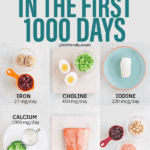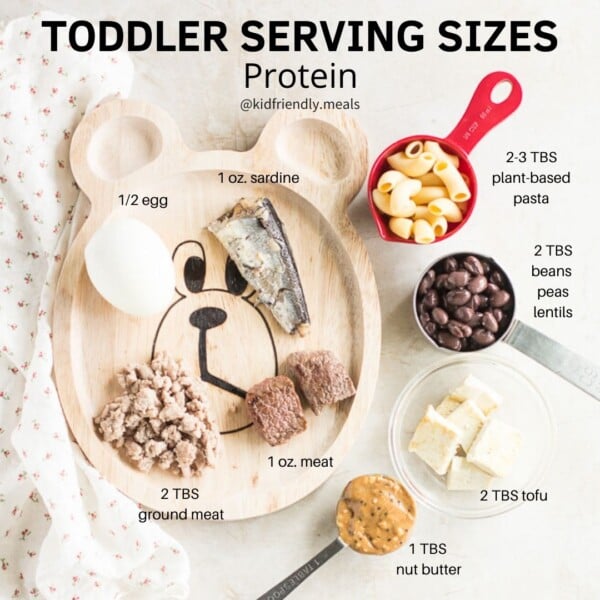This post may contain affiliate links. Please see our disclosure policy for more details.
From being pregnant to caring for a baby to transitioning into toddlerhood, I believe most of us can agree that the first 1000 days are filled with dichotomous moments.
The days are downright exhausting and absolutely magnificent. You’re bawling one moment and jumping up and down the next. Every.Single.Day seems like an eternity in the moment but before you know it, they’re 1 and then 2….
Unfortunately, trying to juggle a million and one things while caring for a little one, which is a 24/7 job of its own, leaves us moms (and dads) very little room for self-care and proper nutrition.
However, did you know that proper nutrition during the first 1000 days (the period beginning at conception to two years of life) has a profound impact on a child’s ability to grow, learn, and thrive?
Here’s what you can expect from this post:
Why the First 1000 Days Matters?
Brain Development
While the brain continues to grow and evolve throughout life, the most rapid period of brain growth and highest plasticity take place in these first 1000 days.
To put it into perspective, at birth, a baby’s brain is only a quarter of the size of an adult’s brain. But by age 3, it grows to be about 80% of that of the adult’s. It’s during this time when the brain is most “programmable” and vulnerable to any nutritional deficit.
Here’s a quick overview of what takes place in the baby’s brain. Did you know that babies are born with more neurons (brain cells) than there are stars in the Milky Way? Mind-blowing, right? And these neurons start communicating with each other and form what are called synapses at a very rapid rate.
Good nutrition and healthy eating habits during this time allow these synaptic connections to function most optimally, thus providing the essential building blocks for maximum brain development.
Lifelong Health
Keep in mind, the brain is not a stand-alone system. It is connected to all the other body systems, including immune, cardiovascular, metabolic, and gastrointestinal. And together they form what is commonly referred to as the “mind-brain-body” system.
Fetal and early life nutrition has been linked to setting the risk for chronic diseases later in life, including heart disease, type 2 diabetes, some types of cancer, asthma, and osteoporosis.
Lifelong eating habits
It is also during this time that food preferences and healthy eating habits are established. While food preferences do change throughout life, there is strong evidence that food preferences and the variety of foods eaten during the first 1000 days remain consistent throughout life.
Whew, well that sounds like a lot of pressure, doesn’t it? But my hope is that reading this will motivate you to prioritize nutrition and enjoy well-balanced meals with your little one!
Nutrition During the First 270 Days (Pregnancy)
A healthy baby starts with a healthy mother as a mother’s diet and her nutrient sources are the only sources of nutrition for the growing baby. This is also the time when babies begin to develop food preferences.
What mom eats has a great impact on shaping her child’s preferences as flavors from mom’s diet get introduced to the baby via the amniotic fluid. And of course, optimal nutrition is important for the mom’s well-being!
Essential Nutrients
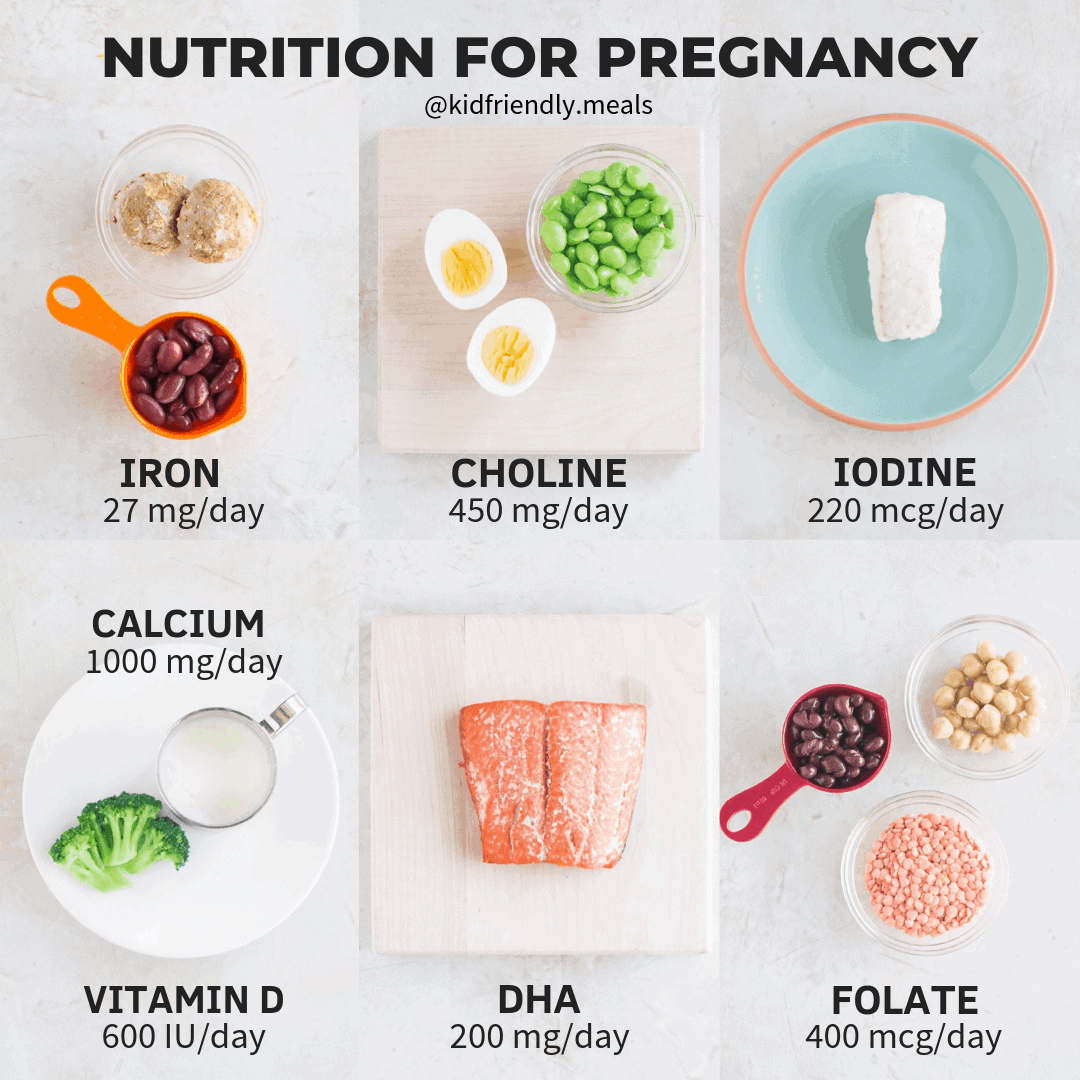
Here are the nutrients you want to pay special attention to during this time.
- Iron
- Necessary to transfer oxygen to organs and tissues.
- Need double the amount that a non-pregnant woman needs to help your body make more blood to supply oxygen to your fetus.
- Be sure to pair plant-based sources with vitamin C to enhance its absorption.
- Choline
- Assists in the development of the baby’s nervous system, brain, and neural tube.
- More in-depth information can be found in this post – Baby-Friendly Egg Veggie Pancakes.
- Iodine:
- A major component of thyroid hormones. It is necessary for the production of fetal thyroid hormones (fetal thyroid begins to function around the 12th week of gestation)
- Deficiency can increase the risk of spontaneous abortion, birth defects, neurological disorders.
- It is considered by WHO as the most important preventable cause of brain damage.
- Calcium and Vitamin D
- Necessary for the healthy development of a baby’s teeth, bones, heart, nerves, and muscles. If mom doesn’t get enough calcium during pregnancy, it is taken from her bones and goes to the baby. It also helps maintain healthy blood pressure.
- Vitamin D helps the body absorb calcium and plays a role in the proper functioning of your nerves, muscles, immune system.
- Folate/Folic acid
- Folate = naturally found in foods, folic acid= synthetic form
- Folic acid needs to be broken down to be used by the body. However, for those who have metabolic defects like MTHFR (which is quite common!), the synthetic folic acid won’t get metabolized by the body, resulting in the harmful accumulation of unmetabolized folic acid.
- Reduces the risk of neural tube and heart defects.
- Supports proper development of the placenta.
- Vitamin A
- Essential for cell differentiation and proliferation as well as the development of the spine, heart, eyes, and ears.
- DHA
- Helps to reduce the risk of preterm birth, low birth weight, and post-partum depression.
- important for the development of your baby’s brain and the nervous system .
- Cannot be synthesized by the body so it MUST be obtained from diet or supplementation. For more in-depth information, head on over to Omega-3 Fatty Acids for Mom and Baby.
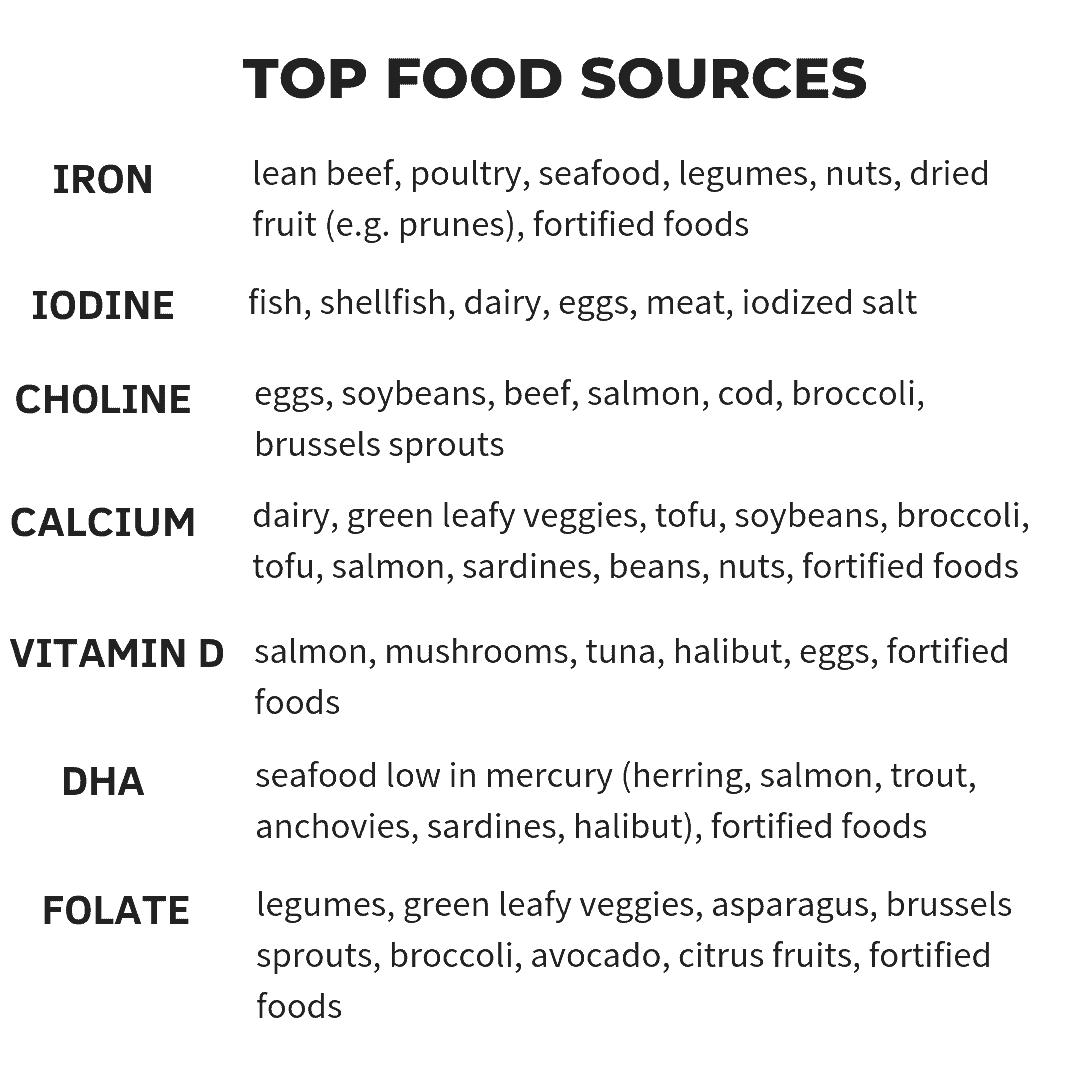
And if you’re feeling a bit overwhelmed looking at that list, remember – we eat food, not nutrients. Don’t get caught up on the numbers. Instead, focus on eating the rainbow and enjoying a wide variety of nutrient-dense foods.
First Trimester
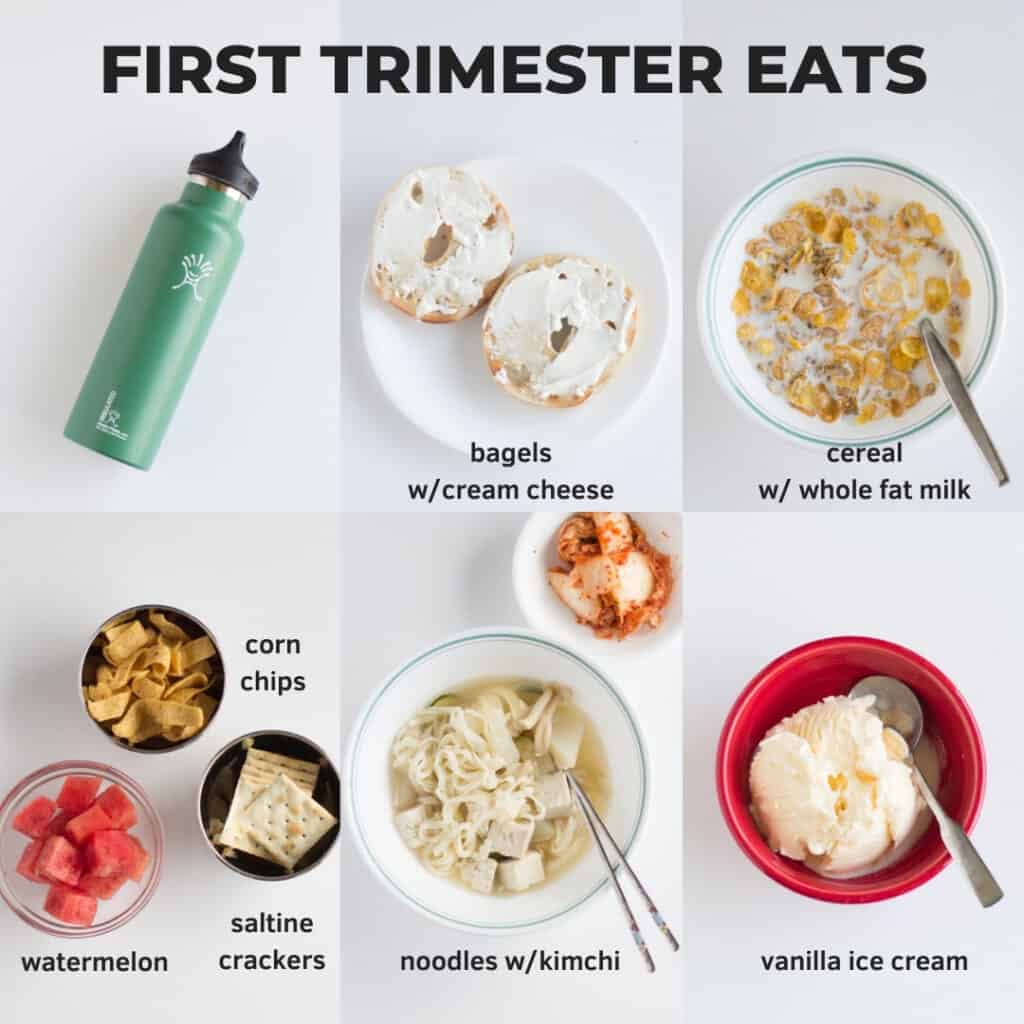
With my first child, I didn’t experience any of the first trimester woes that I’ve heard so much about. Then came my second baby, and whoa…morning sickness is just downright miserable!
The only thing I could keep down was plain food. Lots of carbs and just thinking about eating vegetables was horrendous. If you’re in the same boat, don’t stress about it too much! Once you start feeling better, focus on variety.
Prenatal Vitamins
Even with a healthy diet, you can miss out on these key nutrients. Taking a daily prenatal vitamin at least 3 months before conception will act as a safety net, ensuring that you don’t lack any essential nutrients that are important for growing your baby.
But not all prenatal supplements are created equal. Look for high-quality vitamins that do not contain harsh chemicals, parabens, phalates, artificial flavors or colors.
I also take a vitamin D and DHA supplement.
Self-Care
It’s important to nourish you and your baby with wholesome food. However, it’s equally important to focus on your mental and emotional well-being as well.
Reduce stress. High levels of maternal anxiety have been associated with poorer birth outcomes, including preterm delivery, lower birth weight, poorer neurological scores at birth, and delayed infant cognitive development.
Get moving. Do what makes you and your body feel good whether it’s going for a walk, doing yoga, swimming… Always listen to your body and don’t overdo it.
Set boundaries. If something doesn’t serve you, don’t be afraid to say no. I’m working really hard on this myself.
Pause. Recharge your batteries doing what you love!
Nutrition During Baby’s First Year (365 Days)
Babies are born ready to learn! Did you know at birth, they have 85 billion neurons (cells that make up the brain and nerves) that are ready to fire and do all kinds of amazing things?
As mentioned earlier, the first years are when the fastest rate of brain development takes place in the entire life span! To support this tremendous growth, the brain dominates the body’s metabolism in the early years.
In fact, 60 percent of an infant’s metabolic energy, or the energy required to keep all the body’s systems functioning properly, is spent on growing the brain. To help put that into perspective, an adult’s brain only uses about 25 percent of the body’s metabolic energy.
This is also the time in life when MOST willingness to try and accept new foods occurs. Take full advantage of this window of opportunity!
For moms:
- Eat.sleep.move. However, unlike before, everything else can’t wait. You now have this tiny human who depends on you completely! Is this hard to do? Heck yes! Is it impossible? no! Even just 10 minutes out of the day to focus solely on yourself can bring so much refreshment and the strength to continue giving your baby the best possible care.
- Consume a well-balanced diet. Remember that what you eat has a great impact on your breastmilk nutrient content. Lactating women also have increased nutrient needs compared to non-lactating women.
- The recommendation is to continue taking a high-quality prenatal vitamin while breastfeeding to ensure that you are getting the nutrients necessary for recovery and for baby’s growth.
- The first weeks/months are rough. Nothing in life prepares you for it. You may be too tired or focused on taking care of your baby’s needs that you forget to nourish yourself properly. In this case, prenatal vitamins will help fill in any nutritional gaps for the time being.
For babies:
0-6 months:
- Exclusively breastfeed until 6 months of age, if possible, and continue after solids are introduced for at least the first year.
- Some babies may need complementary foods earlier but not before 4 months of age.
- If not breastfeeding, give approved infant formula. Cow’s milk is not recommended until 1.
6-12 months:
- Baby’s stores of nutrients, such as iron and zinc, are decreasing while their nutritional requirements increase drastically. Neither human breast milk nor infant formula alone are sufficient to meet the baby’s nutritional needs. Therefore, the introduction of solid foods is ESSENTIAL
- This phase isn’t just about providing energy. Introducing solid foods is also important for developing acceptance of different food textures and flavors and laying down the foundation of healthy eating habits.
- Offer a wide variety of nutritious foods, with top priorities given to iron and zinc.
- Pay attention to the developmental signs of readiness.
- Check out these resources:

Is your baby 6 months old and up?
Learn all the secrets to starting solids safely while optimizing nutrition!
Nutrition During Baby’s Second Year (365 Days)
The child’s brain is continuing to grow rapidly so keep on nourishing it through good nutrition. This is also the time when your once adventurous eater may start to become timid about trying new foods and even reject what they used to love.
I want to reassure you that this is a NORMAL and expected part of development. Keep offering a wide variety of flavors and textures.
Resources:
Key Nutrients
Here are the key nutrients that support brain development
- Protein
- Iron
- Zinc
- Choline
- Folate
- Iodine
- Vitamins A, D, B6, B12
- Omega 3 Fatty Acids
I could give you a long list of all the food sources for each of these nutrients. But to make it easier, here are the top foods to enjoy often with your child. I know some are quite broad, like whole grains. Again, variety is the name of the game. Oats, quinoa, rice, buckwheat, farro…they are all fantastic!
- Eggs, fish (wild-caught salmon, sardines, etc. ), meat, poultry, legumes, whole grains, dark leafy vegetables (spinach, kale, chard, etc.), starchy vegetables, nuts and seeds
Related Post: Best First Foods for Babies
It’s NOT All about Nutrition
While I primarily focused on nutrition up to this point, I want to end with this. Children need 3 things in order to thrive as adults.
- Stable, responsive relationships with parents (and other caregivers)
- Proper nutrition
- Safe and loving environment
Research shows that what infants prefer most out of everything is a human face, voice, touch, and smell.
So yes, nutrition is absolutely important to grow and develop. But so is unconditional love and affection. So remember to give your little one your tender and responsive attention and affection.
Enjoy reading books together, playing music, soaking up the sun, etc. And be sure to touch them often. Out of all the sensory experiences, touch is how they know they are loved.

